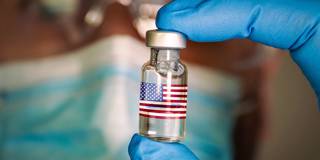Nationalism is no way to confront a virus that is indifferent to nationality. Now that safe and effective COVID-19 vaccines are available, the US has four good reasons to lead a Marshall Plan-like effort to immunize the world's poor countries.
CAMBRIDGE – A century ago, an influenza pandemic killed more people than died in World War I. Today, the COVID-19 pandemic has killed more Americans than died in all US wars since 1945. A big difference, however, is that science did not have a vaccine for the influenza virus back then, but now several companies and countries have created vaccines for COVID-19.
A number of wealthy democracies, including the United States and the United Kingdom, have vaccinated over half their adult populations and seen a dramatic reduction in the number of new cases and deaths. Other places, such as India, Brazil, and parts of Africa, have low vaccination rates and high rates of new cases and deaths. The Economist estimates that the pandemic’s true global death toll may be something like ten million people, or more than three times the official number reported by national authorities.
Given these grim statistics, should leaders of wealthy countries export vaccines and help vaccinate foreigners before they finish the job at home? When former President Donald Trump proclaimed “America First,” he was being consistent with democratic theory, according to which leaders are entrusted with defending and advancing the interests of the people who elected them. But as I argue in my book Do Morals Matter? the key question is how leaders define the national interest. There is a major moral difference between a myopic transactional definition, like that of Trump, and a broader, far-sighted definition.

CAMBRIDGE – A century ago, an influenza pandemic killed more people than died in World War I. Today, the COVID-19 pandemic has killed more Americans than died in all US wars since 1945. A big difference, however, is that science did not have a vaccine for the influenza virus back then, but now several companies and countries have created vaccines for COVID-19.
A number of wealthy democracies, including the United States and the United Kingdom, have vaccinated over half their adult populations and seen a dramatic reduction in the number of new cases and deaths. Other places, such as India, Brazil, and parts of Africa, have low vaccination rates and high rates of new cases and deaths. The Economist estimates that the pandemic’s true global death toll may be something like ten million people, or more than three times the official number reported by national authorities.
Given these grim statistics, should leaders of wealthy countries export vaccines and help vaccinate foreigners before they finish the job at home? When former President Donald Trump proclaimed “America First,” he was being consistent with democratic theory, according to which leaders are entrusted with defending and advancing the interests of the people who elected them. But as I argue in my book Do Morals Matter? the key question is how leaders define the national interest. There is a major moral difference between a myopic transactional definition, like that of Trump, and a broader, far-sighted definition.